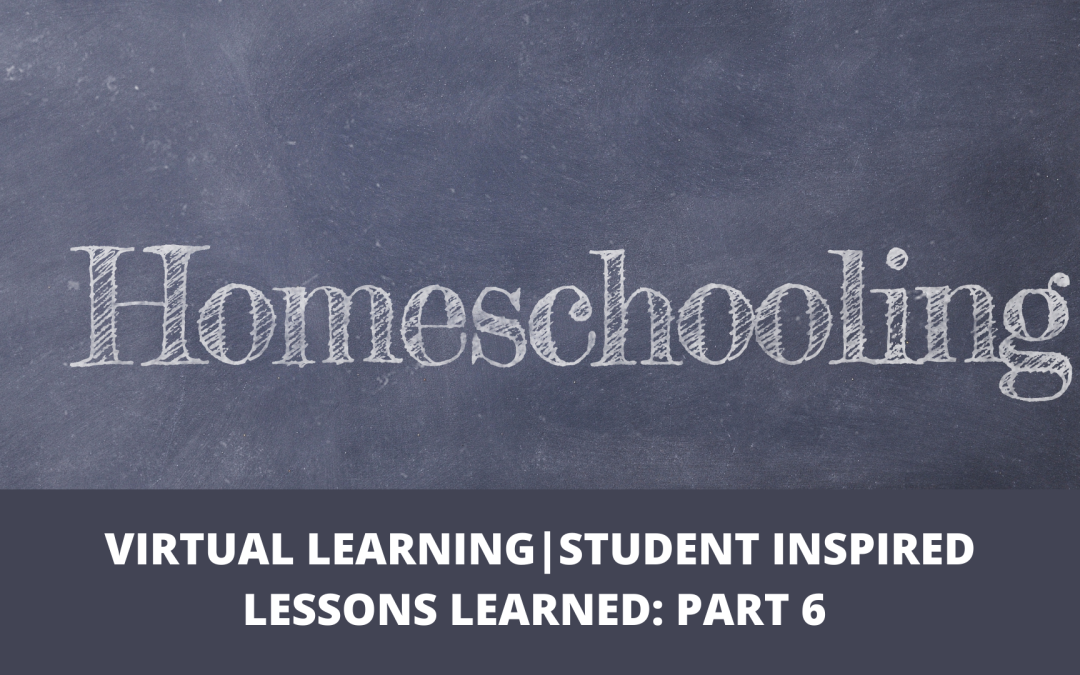In this special six-part series, we reviewed over 700 students responses to a school year 2020-21 essay/scholarship contest sponsored by International Virtual Learning Academy (https://internationalvla.com/), a division of Global Student Network (www.globalstudentnetwork.com). The essay question posed was: “What was the most significant takeaway you believe students learned about online education during the coronavirus pandemic?”
Previous articles in this series addressed:
- Part One – We summarized ten important lessons learned about online school.
- Part Two – We addressed Lessons 1 – 5, as identified in Part One.
- Part Three – We completed our review with a look at Lessons 6 to 10, as identified in Part One.
- Part Four – We focused on what surfaced as the main “lesson learned” by survey respondents – the importance of self-motivation and self-discipline.
- Part Five – We sampled comments by students about the positive and negative aspects of technology and related logistical virtual learning limitations faced during COVID-19.
THE RESULTS/KEY TAKE AWAYS
(BASED ON STUDENT ESSAY RESPONSES)
Part One/The Big Picture:
- The value of students, teachers and parents working together cannot be over-emphasized.
- Teaching methods must be tailored to individual students’ needs and be as flexible as possible.
- Knowing students well is the most important element of teaching.
- The “hybrid” mix of in-class and at-home learning is likely here to stay.
- Opting to learn from home gave many students the chance to “own” their personal learning style.
- New learning models must support the well being of both teachers and students.
- Students reported learning the value of considering the connection between what they do and how it affects others.
- Many students learned that family connections matter more than they realized.
- Technology-based education worked well, is getting better every day, and there’s no going back.
- Students learned valuable lessons about managing their own time rather than depending on their parents and teachers to pressure them to meet deadlines.
Part Two/Student Comments and Observations:
- Online learning is just one way of learning. It’s an asset in our lives rather than a new life.
- The most significant takeaway about online education is that we should keep an open mind and have patience.
- Students developed connections with each other and learned more about one another – things that would not have been learned if the pandemic had not occurred.
- Students learned the importance of “uplifting each other” and giving unconditional love and support to those around them.
- Although virtual learning may not be for everyone, it’s clear it provides a valid education.
Part Three/Motivation and Time Management:
- Students learned both the positive and negative aspects of virtual learning. New learning models must be directed towards experiences that support the well-being of both students and teachers.
- Every student must be able to point to a class/room/community they depend on.
- Through virtual learning, students learned to value the hard work their teachers and parents contribute to their individual education.
- Online education provided access to a wider range of courses than does in-person instruction.
- Students learned how to self-study and schedule their free time as well as learn the skill of self-motivation.
Part Four/The Main Lessons – Self Discipline and Motivation:
- Students learned the importance of self-motivation.
- Students strengthened their ability to learn independently and become self-sufficient learners.
- Virtual learning taught students that, without self-motivation, it’s difficult to work and learn in the same place you find comfort.
- Online school helped motivate students to learn to adapt to change.
- Online education requires planning, discipline and positive work habits.
Part Five/Technology and Logistical Limitations:
- Technology became easier for most students. Zoom and Google Classroom became second nature.
- Students learned technology skills that will be valuable for the rest of their lives.
- Many students did not have access to technology and stable Internet connections. Making the shift to public access technology is a must.
- All students should have access to a laptop and basic Wi-Fi.
- Students should be held accountable for assisting classmates who need help with technology.
- Virtual classes for individuals with chronic illnesses or other health or emotional problems must be easily available at no cost.
- Poor Wi-Fi connections caused problems for many students. Broadband access (including broadband video) must be expanded to the entire United States.
- Teachers should be provided with adequate, no-cost, tech training so they can handle online school.
FINAL WORDS:
No one says it better than our students: “I feel the challenge of online school helped motivate people to learn to adapt to change. The students who were able to learn how to alter their study habits and class preparations were the most successful in each course and saw the most improvement overall in their class performance. Students who may not have been engaged in-person were forced to be self-motivated for the sake of their grades. Although a stressful way to learn how to get organized, it was a valuable lesson many students will find highly beneficial when we return to in-person schooling.”
Another student wrote: “Online classes have been important for students to learn technology skills that will be valuable for the rest of their lives.”
We couldn’t have said it better.
